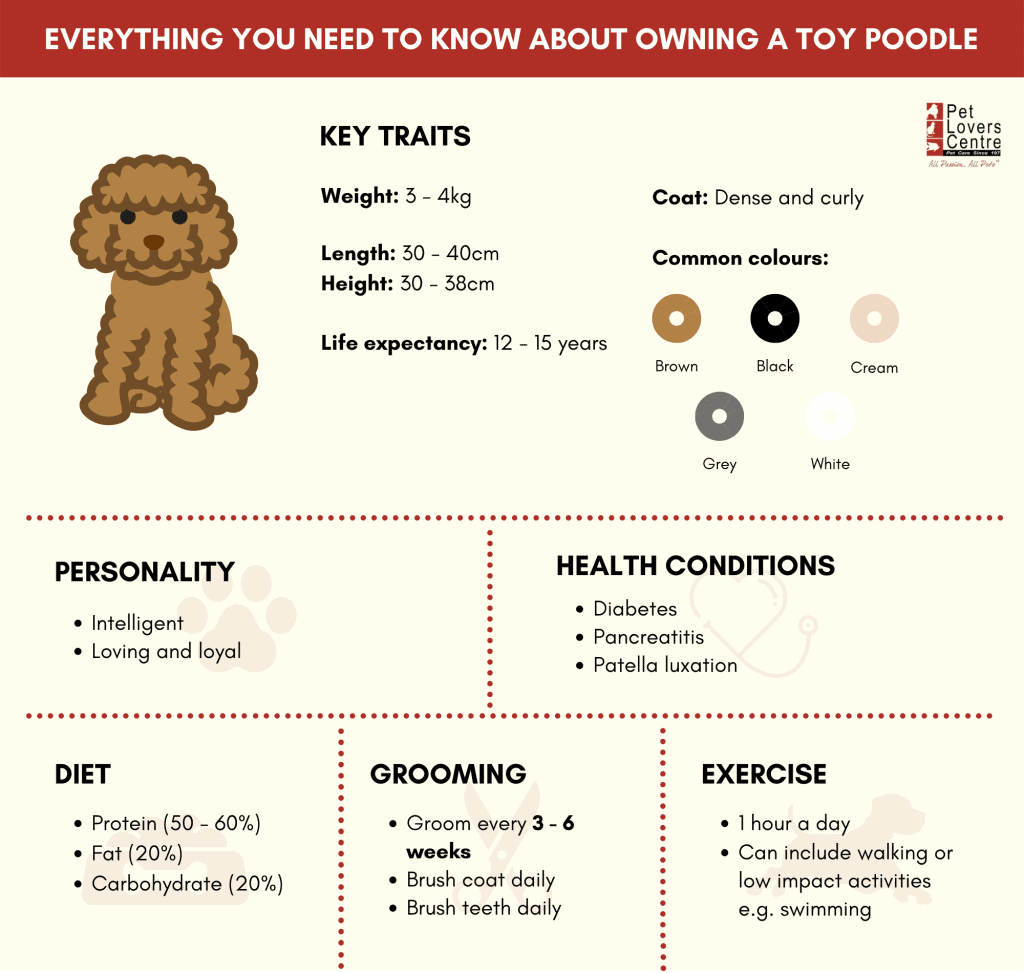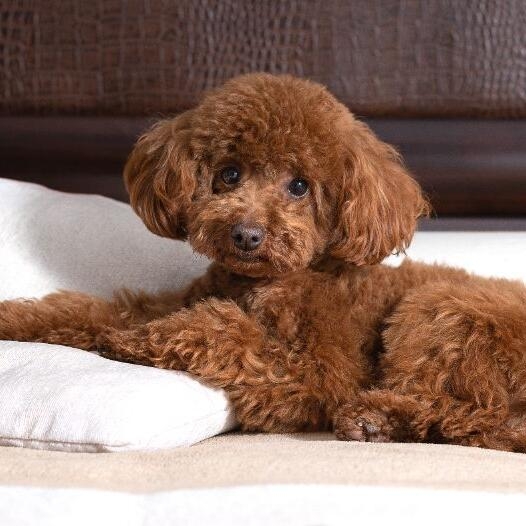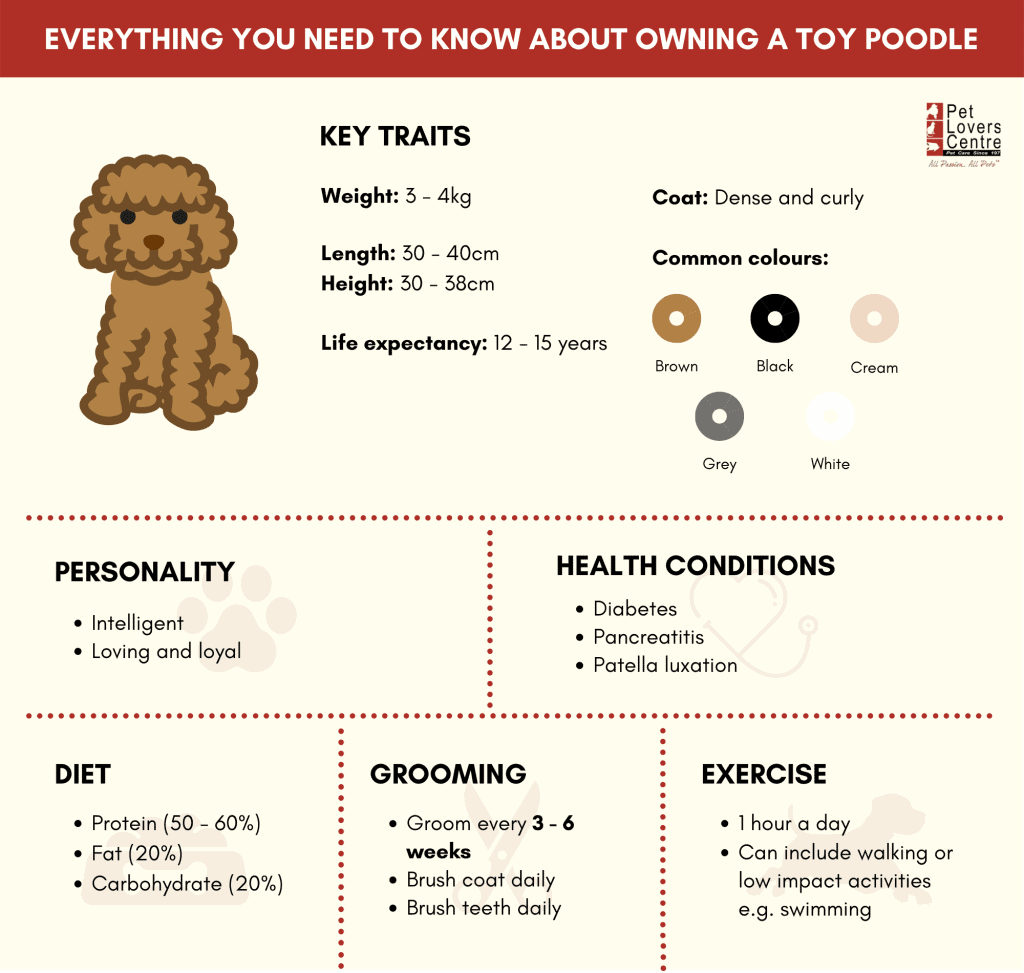Are you considering getting a toy poodle? These small and intelligent dogs make great companions, but it’s important to know what they need to thrive. Did you know that despite their small size, toy poodles have an abundance of energy and intelligence? This means they require mental stimulation, regular exercise, and a well-balanced diet to keep them happy and healthy.
To ensure the well-being of your toy poodle, there are a few essential things you’ll need. First and foremost, a comfortable and safe living environment is crucial. This includes a suitable bed, toys for mental stimulation, and a designated space for them to play and relax. Additionally, regular grooming is essential for toy poodles, as their curly coat requires frequent brushing and occasional professional grooming. Lastly, don’t forget about their nutritional needs. High-quality dog food that meets their specific dietary requirements is vital to support their overall health and longevity.
When it comes to caring for a toy poodle, there are a few essential items you’ll need. Start with a high-quality dog food specifically formulated for small breeds. Provide your toy poodle with a comfortable bed and toys for mental stimulation. Don’t forget grooming supplies like a slicker brush and nail clippers. You’ll also need a leash and collar for walks and identification purposes. Lastly, schedule regular veterinary check-ups to ensure your toy poodle’s health and well-being.

Essentials for a Toy Poodle
If you’re considering getting a Toy Poodle as a pet, it’s important to know what you need to provide for their well-being. These small and intelligent dogs have specific needs that should be met to ensure they are happy and healthy. From grooming tools to the right kind of toys, this article will guide you through the essentials for a Toy Poodle.
1. Proper Nutrition
The first and foremost requirement for any dog, including a Toy Poodle, is a balanced and nutritious diet. A proper diet is essential for their overall health and well-being. Toy Poodles are prone to certain health issues, such as digestive problems and obesity, so it’s crucial to feed them high-quality dog food that is specifically formulated for their size and age.
Consult your veterinarian to determine the right type and amount of food for your Toy Poodle. They may recommend a diet that is low in fat to prevent weight gain and include essential nutrients to support their coat health. Additionally, provide fresh water at all times to keep your Toy Poodle hydrated.
2. Grooming Supplies
Toy Poodles have a thick, curly coat that requires regular grooming to keep it healthy and mat-free. Invest in the following grooming supplies to maintain your Toy Poodle’s coat:
- Grooming brush or comb
- Professional grooming shears
- Dog-friendly shampoo and conditioner
- Nail clippers or grinder
- Toothbrush and toothpaste formulated for dogs
- Ear cleaning solution
Regular grooming sessions will not only keep your Toy Poodle looking its best but also help prevent matting, skin issues, and ear infections. It’s recommended to consult a professional groomer or watch tutorials to learn the proper grooming techniques for Toy Poodles.
3. Comfortable Bed and Crate
A comfortable bed and crate are essential items for your Toy Poodle’s well-being. Provide a soft and cozy bed where your dog can rest comfortably. Look for beds that are machine washable for easy cleaning.
A crate can serve as a safe space for your Toy Poodle and aid in house training. Choose a crate that is the appropriate size for your dog, allowing them to stand up, turn around, and lie down comfortably. Crate training can also help with separation anxiety and provide a secure place for your Toy Poodle when you’re not at home.
4. Toys for Mental Stimulation
Toy Poodles are intelligent dogs that require mental stimulation to prevent boredom and destructive behavior. Invest in a variety of toys that are suitable for small dogs and can keep them engaged. Puzzle toys, treat-dispensing toys, and interactive toys are excellent choices to challenge your Toy Poodle’s mind.
Rotate the toys regularly to maintain your dog’s interest. Additionally, provide chew toys to satisfy their natural instinct to chew and prevent them from damaging your furniture or belongings.
5. Collar, Leash, and Identification
Every dog, including a Toy Poodle, should wear a collar with identification tags at all times. The collar should fit comfortably and have proper identification, including your contact information.
A sturdy leash is essential for walks and outings. Opt for a lightweight and durable leash that is suitable for small dogs. It’s important to leash train your Toy Poodle to ensure their safety and the safety of others.
6. Training and Socialization
Toy Poodles are highly intelligent and trainable dogs. Invest time and effort into their training and socialization to ensure they become well-behaved and adaptable pets.
Enroll your Toy Poodle in puppy classes or work with a professional dog trainer to teach them basic commands and good manners. Socialize them with people and other animals from a young age to prevent fearfulness or aggression.
7. Regular Exercise
Despite their small size, Toy Poodles have lots of energy and require regular exercise to stay healthy and happy. Daily walks, play sessions, and interactive games will help keep them physically and mentally stimulated.
Ensure that your Toy Poodle gets the right amount of exercise based on their age, health, and energy level. However, avoid excessive exercise or intense physical activities that can strain their joints and cause injuries.
8. Health Care Essentials
As with any pet, regular veterinary care is essential for the well-being of a Toy Poodle. Schedule routine check-ups, vaccinations, and preventive treatments, such as flea and tick control, as recommended by your veterinarian.
Keep an emergency contact list of local veterinarians and animal clinics in case immediate medical attention is needed. Also, consider investing in pet insurance to help offset the costs of unexpected veterinary bills.
9. Safety Precautions
Creating a safe environment for your Toy Poodle is crucial to prevent accidents and injuries. Take the following safety precautions:
- Remove toxic plants and chemicals from your home.
- Secure electrical cords and keep them out of your dog’s reach.
- Use baby gates or crate your Toy Poodle to restrict access to certain areas.
- Keep small objects and choking hazards away from your dog.
Regularly inspect your home for any potential hazards and address them promptly to ensure the safety of your Toy Poodle.
10. Love and Attention
Above all, Toy Poodles thrive on love and attention from their owners. Spend quality time with your dog, provide plenty of affection, and make them feel a part of your family. A happy and well-loved Toy Poodle will be a delightful companion for many years to come.
Comparison of Popular Toy Poodle Beds
| Bed Brand | Size | Material | Price Range |
|---|---|---|---|
| Brand A | Small | Memory Foam | $30-$50 |
| Brand B | Small to Medium | Orthopedic Foam | $40-$70 |
| Brand C | Extra Small | Plush Fabric | $20-$35 |
| Brand D | Small | Waterproof Nylon | $25-$45 |
Key Takeaways: What Do You Need for a Toy Poodle?
- A proper-sized crate or kennel for their comfort and safety.
- High-quality dog food tailored to their small size and specific nutritional needs.
- Toys and interactive games for mental stimulation and exercise.
- Grooming tools like brushes, combs, and clippers to maintain their coat.
- A comfortable bed or blanket for them to sleep and relax on.
Frequently Asked Questions
In this section, we will address some commonly asked questions about what you need for a toy poodle. Whether you’re a first-time pet owner or considering adopting a toy poodle, these questions and answers will help you understand the essentials for caring for this adorable breed.
1. What type of food is suitable for a toy poodle?
A toy poodle’s diet should consist of high-quality dog food that is specifically formulated for small breeds. Look for dog food that contains real meat as the main ingredient and avoids artificial additives or preservatives. Additionally, toy poodles have specific dental needs, so choose food that promotes dental health, such as kibble with a texture that helps clean their teeth. It’s important to follow the feeding guidelines provided by the food manufacturer and consult with your veterinarian to determine the appropriate portion sizes for your toy poodle.
Remember to provide fresh water at all times and avoid feeding your toy poodle human food, as some ingredients can be harmful to dogs. If you have any concerns or questions about your toy poodle’s diet, consult with a professional veterinarian.
2. How often should I groom my toy poodle?
Toy poodles require regular grooming to keep their coat in good condition and prevent matting. Ideally, they should be groomed every 4-6 weeks. This includes brushing their coat to remove tangles, trimming the hair around their face, ears, and feet, and bathing them with a gentle dog shampoo. Grooming also includes regular nail trimming, teeth brushing, and ear cleaning.
If you’re not comfortable grooming your toy poodle yourself, it’s best to seek professional grooming services from a reputable groomer who is experienced with toy poodles. They can provide the necessary grooming techniques to keep your toy poodle looking fabulous.
3. What supplies do I need for a toy poodle?
To provide a comfortable and safe environment for your toy poodle, you will need a few essential supplies. These include:
- A suitable dog bed or crate for them to rest in
- Durable food and water bowls
- A variety of toys for mental stimulation and playtime
- A leash and harness for walks and outings
- Grooming tools such as brushes, combs, and nail clippers
- Dog shampoo and grooming products
- Puppy pads or a designated area for toileting
- Collar with identification tags
These supplies will ensure that you have everything you need to care for your toy poodle and meet their daily needs.
4. Do toy poodles require regular exercise?
Yes, toy poodles do require regular exercise despite their small size. Daily walks, playtime, and mental stimulation are essential for their physical and mental well-being. Aim for at least 30 minutes to an hour of exercise each day, split into multiple shorter sessions to prevent overexertion. Consider interactive toys or puzzle toys that can provide mental stimulation for your toy poodle.
Always supervise your toy poodle during exercise and be mindful of their energy levels, especially during hot or cold weather. Consult with your veterinarian for specific exercise recommendations based on your toy poodle’s age and health condition.
5. How can I ensure the safety and well-being of my toy poodle?
To keep your toy poodle safe and healthy, there are several precautions you should take:
- Ensure your home is puppy-proofed, removing any hazards or toxic substances that could harm your toy poodle
- Keep them on a leash or in a secure, fenced-in area during outdoor activities
- Regularly visit the veterinarian for check-ups, vaccinations, and preventive care
- Provide proper nutrition and fresh water at all times
- Supervise them during playtime with other pets or young children
- Keep their coat groomed and free from mats
- Stay up to date with grooming, including teeth brushing, nail trimming, and ear cleaning
By following these guidelines, you can create a safe and loving environment for your toy poodle, ensuring their well-being and happiness.

In summary, owning a toy poodle requires several essential items. Firstly, a comfortable dog bed to provide a cozy sleeping space. Additionally, a high-quality dog food that meets the specific needs of toy poodles, as well as food and water bowls. Regular grooming is crucial, so a slicker brush, comb, and dog-friendly shampoo are necessary. Along with grooming, regular exercise is important, so a leash and collar or harness are needed for walks. Finally, don’t forget basic training supplies like treats and toys to keep your toy poodle stimulated and happy.
By ensuring you have these essential items, you’ll be well-prepared to provide a loving and comfortable home for your toy poodle. Remember, they may be small in size, but they bring immense joy and companionship to your life.
